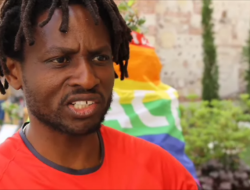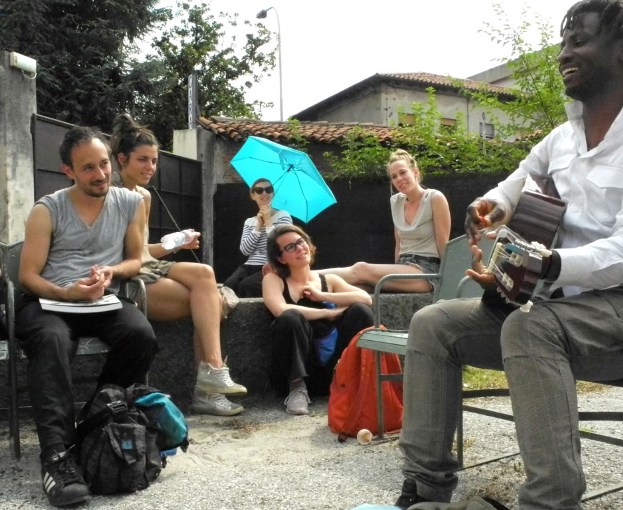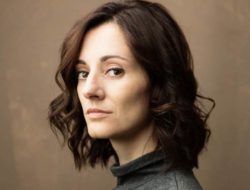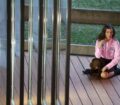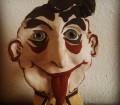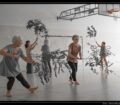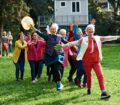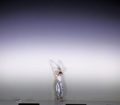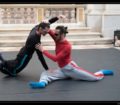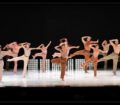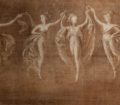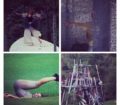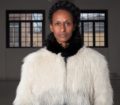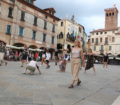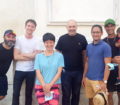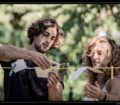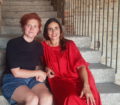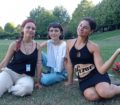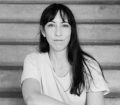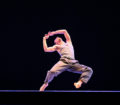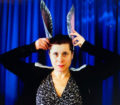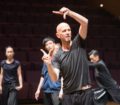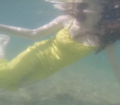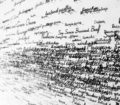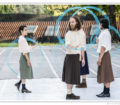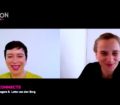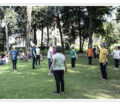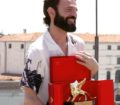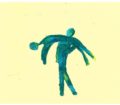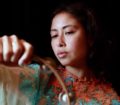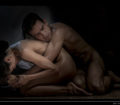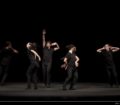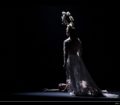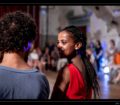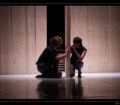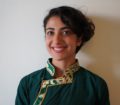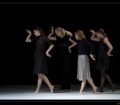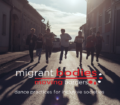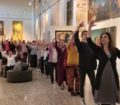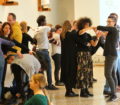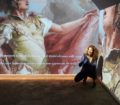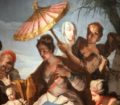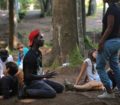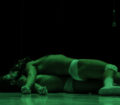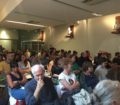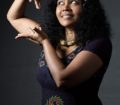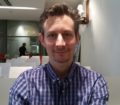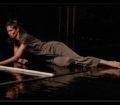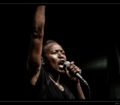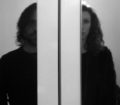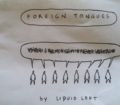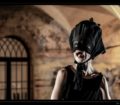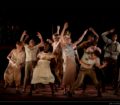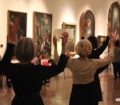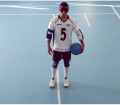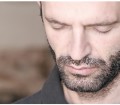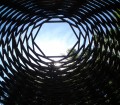The first time I met John Mpaliza was one year ago in Bassano del Grappa, during the Italian tour of Migrant Bodies, an European project in which I’ve been involved as writer, together with choreographers, dancers and video-makers from all around the world. It was a sunny day, we were sitting in circle, listening to the amazing story of our special guest.
He told us, his body is the only thing he had and that’s the reason why he decided to just start walking. Indeed, John Mpaliza is a “Peace Walking Man”. He is an Italian activist, born in Congo, a country that he left for political reasons. Nowadays, he’s walking and singing all around Europe in the name of peace, in the name of hope.
Here is an extract from the extraordinary conversation that we had with him.
Migrant Bodies | The 1st of July 2014 -CSC Garage Nardini, Bassano del Grappa. Speaker and vocalist: John Mpaliza. Lyrics by Solomon Popoli Linda, Bob Dylan, Fadhili William Miriam Makeba, Them Mushrooms/Uyoga. Radio-feature, editing and mixing by Anna Trevisan
So, I’m John Mpaliza, I’m 44 years old. I’m Italian, from the Congo—former Zaire— in the centre of Africa.
As I said, I’m not a musician but I’ve been an IT engineer but I stopped working last May because I decided to dedicate all my life to what I’m doing now. […]
I’m a peace walking man.
MUSIC The Lion Sleeps Tonight
[…] Some of you can ask what’s that symbol. It’s a symbol of mourning, when you’ve lost people, friends or parents and relatives, because in the war in Congo I lost my father. I also lost a sister but we didn’t find her [body]. So she is…“sparita”[—disappeared]. Yes, she was one of the people, one of the girls who were kidnapped by the rebels in Congo. That’s a really sad situation that people are living through in Congo. So, five years ago I decided to wear that symbol of mourning, so I can remember every morning that I have to do something, I have to do something.
MUSIC Blowing in the wind
In South Africa “Ubuntu”means that you exist because I exist. So, there is a connection between all people.
MUSIC: Blowing in the wind
So, let me tell you what’s happening in Congo and why I began walking. I don’t know … is there somebody here who can say that they don’t have a mobile phone?
“I don’t”.
You don’t. Don’t you have a computer?
“Yes, I do”.
You do, and you also have that camera. So, you have to know that these electronic devices need a mineral which is called coltan and coltan is a semiconductor that is used to make capacitors.
The more of it you put in the better the technology is. The problem is that the 80% of coltan is in the Congo. And it is not only in mobile phones. It’s in tablets, camera, computers, airbags for cars…It’s in everything. So, it’s in all the technology of the last generation. So, they need coltan, components made with coltan. But the problem is that to have that coltan for free, multinationals as well as large countries that need coltan, they organise an economic war in the Congo. It’s not a civil war like they say: “They are killing each other like monkeys, like in the jungle!”. So, it’s not jungle, it’s something organised like the wars in Iraq, in Iran, in Afghanistan. They are all economic wars organised to take oil, to take energy, to take minerals. So, today people are dying. In less than twenty years, eight million people died in the Congo and four million women were victims of rape, used as a weapon of war and all is connected to our technology. So, we cannot say that what’s happening in the Congo is not our problem. […] We all have a piece of the Congo in our pockets. […] We have co-responsibility for what is happening there. […] Who are the miners in the Congo? They are children! They are people who don’t have a choice— and coltan is also radioactive…
MUSIC: The Lion Sleeps Tonight
That’s why four years ago I decided to try to do something, because I’m an IT engineer I well understand how important it is. So, I decided to do something but I couldn’t find anything because I have no money. So, when you don’t have anything you have to invent something. One morning I realised that my legs are mine, my feet are mine and so I decided to use my feet for peace in the Congo. […] That’s how I began walking. First in Spain, the Camino de Santiago…in 2010 and then in 2011 I did Reggio Emilia to Roma, because I live in Reggio Emilia. Then we organised another walk from Reggio Emilia to Brussels across seven countries. That was really interesting [….].
And going to Brussels we passed Geneva and the High Commission for Refugees, and Strasbourg and the European Parliament [where I tried] to explain the situation, and then to Brussels via Maastricht and other places, Italy, France, Luxembourg. [….] to find a way to break the silence, because there is a kind of a wall of silence on that situation.
MUSIC: Malaika
So, twenty-four years ago I was studying in Kinshasa and I thought of myself as an IT engineer in the Congo. Then [after] having a problem with the government; then [after] being in prison, my sister, who was quite an important person, got me out to prison and then with a few friends we travelled around some African countries. […]
We flew out to Lagos in Nigeria, because we had the money. Then, in Lagos I left my friends —there were three of us — and I continued on to Bamako in Mali and then to Oran in Algeria, and I stopped there for one year to study. And then, as I said, I had friends in Europe and during holidays I decided to go and visit these friends, but to get a visa for Europe was not very easy. Then, after that, I moved to Paris […] to Brussels and then to Rome, but because I was studying in Oran I wanted to go back.
I missed the train from Roma Termini to Fiumicino Airport and then I missed the flight, yet on the same evening there was a bomb at the airport in Algeria.
MUSIC Malaika
So, really something strange happened. In 1993 we didn’t have mobile phones and when I went back to my friend’s home, I found them …they were crying, because I didn’t call and they saw on the TV that there had been a bomb and 150 people died in that airport in Algeria. Then, I decided to stay in Italy. I went to the police and I asked for refugee status. For three years I tried to get that status but it was really complicated and I had a piece of paper [where] it was written [that] it was forbidden to study and to work. Then, in 1997 the Italian government decided to give papers to people who were here and working in a job and then I asked the police to renounce my refugee status, and so then I had normal papers for work and then I moved to Emilia Romagna […] and then I began my study at Parma University. Ok, and now we are here.
MUSIC Malaika
Sometimes when I go somewhere I say: “Don’t call us poor people!”. Yes, there are many people in Africa who are dying, poor people. Africa is made of poor people but Africa is not poor. Everywhere you’ll find something in Africa. My father told me that the Congo is a geological scandal. When a god was giving things, when he flew over Congo, he tripped and everything fell out there, because we have everything: uranium, coltan, gold, diamonds…many things. This is our problem. If we had nothing we could, I think, live in peace.
[…] When I left the Congo I couldn’t call my family for some years to say where I was because they could have had problems. When I left Congo, my family had problems because some of the secret service […] wanted to know where I was […].When Mobutu left the Congo and died in Morocco, I called my family and I said. “I’m in Italy”. After five years! And then they told me that my father died during the war and so on and so on. Ok? […] Then I decided, I understood what I had to do and I decided to change everything. Then all my friends said: “Tu es un peu fou”[you are crazy] but I prefer to be “fou”than to stay silent without doing anything. We have to do something, to find a way to do something. […] I’ve changed completely, completely, completely.
MUSIC Jambo Bwana
I’m not working alone. I’m trying to set-up a group of people, a network of people, let’s say “peace walking men”. So, we have decided to create a “Peace Walking Men Foundation”and they will be people from the Netherlands, from Brussels, from Italy too, and also from the Congo. Next year I’ll walk from Reggio Emilia to Warsaw in Poland and then to Helsinki [….].
In the Congo I said there is not a civil war but they are dividing people there. Then we have to speak about reconciliation — I think that in South Africa they did something really important. So then I’d like to go and meet some people there, maybe to visit the places where Mandela lived, for example, and …when we went to Brussels I met a Belgian journalist, a very important one, who wanted to introduce me to Desmond Tutu, the Reverend Desmond Tutu. […] We then spoke and he said: “If you decide to go to South Africa maybe I can come and I can organise a meeting”. Then, I decided that I’ll walk from a city in Africa to Kinshasa […].
MUSIC Jambo Bwana
[…]I have to go there and to do the same things there. […] We have to act to finish that war. We have to help, to educate people.[…] Today the future is in Africa. […]
Life is there.
Tags: Migrant Bodies

